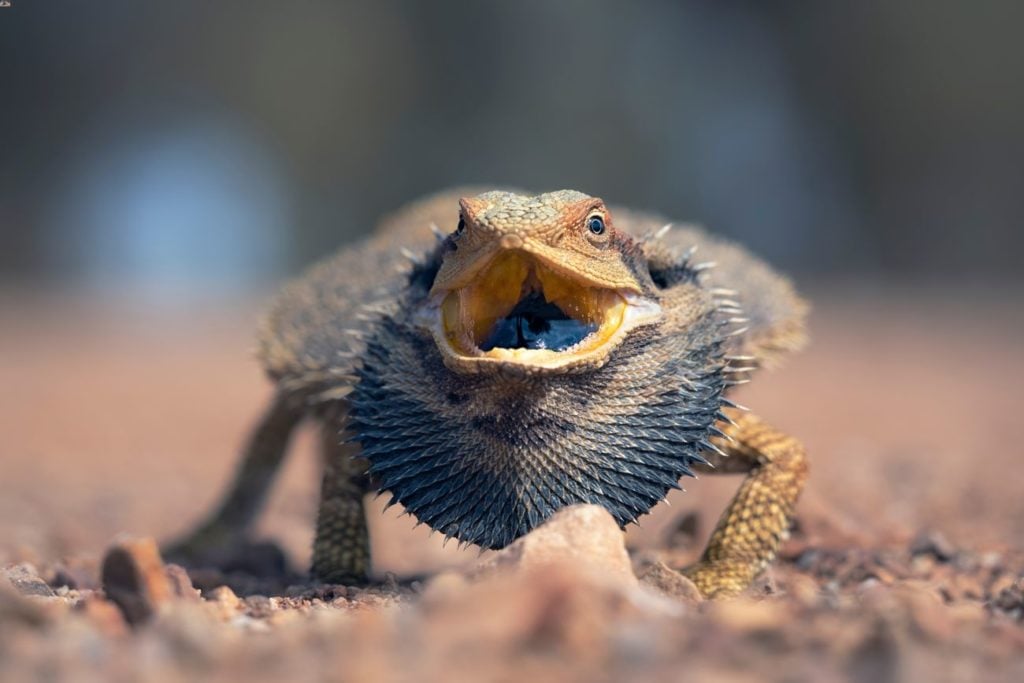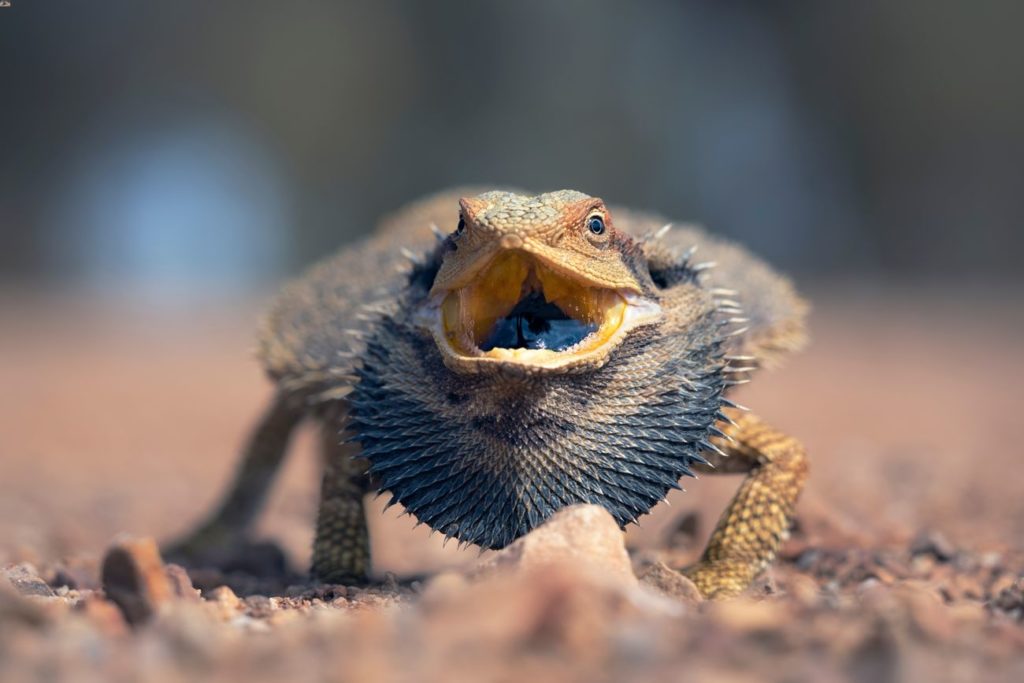Bearded dragons are fascinating creatures that make great pets. They are known for their calm temperament and easy-going nature. However, sometimes they can exhibit strange behavior that can leave their owners puzzled and worried. If you are wondering why your bearded dragon is acting crazy, then this article is for you.
In this article, we will explore some of the common reasons why bearded dragons exhibit erratic behavior. From changes in their environment to health issues, we will provide you with some helpful insights on how to identify and address the underlying cause of your bearded dragon’s odd behavior. So, let’s dive in and learn more about the fascinating world of bearded dragons!
Bearded dragons may act crazy due to several reasons, including stress, illness, improper lighting, or nutrition. If your bearded dragon is restless, aggressive, or lethargic, it’s essential to observe its behavior and consult a veterinarian. Ensure that your bearded dragon has a suitable habitat, UVB lighting, and a balanced diet to prevent behavioral problems.

Why is My Bearded Dragon Acting Crazy?
Bearded dragons are popular pets because of their docile nature and ease of care. However, sometimes they may exhibit unusual behavior that can leave owners scratching their heads. If your bearded dragon is acting crazy, there could be several reasons behind it. In this article, we will explore some of the common reasons why bearded dragons act crazy and what you can do to help them.
1. Temperatures are too hot or too cold
Bearded dragons are cold-blooded animals, which means they rely on their environment to regulate their body temperature. If the temperature in their enclosure is too hot or too cold, it can cause them to behave erratically. A bearded dragon that is too cold may become lethargic, while one that is too hot may become restless and agitated.
To ensure that your bearded dragon’s enclosure is at the right temperature, use a thermometer to monitor the temperature regularly. The basking spot should be between 95-100°F and the cooler end of the enclosure should be around 80°F. If the temperature is too high or too low, adjust the heating and lighting accordingly.
2. Inadequate lighting
Bearded dragons require UVB lighting to produce vitamin D3, which is necessary for calcium absorption. Without adequate lighting, bearded dragons may become lethargic and lose their appetite. They may also develop metabolic bone disease, which can cause them to behave abnormally.
To ensure that your bearded dragon gets enough UVB lighting, provide a full-spectrum UVB bulb in their enclosure. The bulb should be replaced every six months to ensure that it is still producing enough UVB.
3. Stress
Bearded dragons can become stressed for a variety of reasons, including overcrowding, loud noises, and sudden changes in their environment. When they are stressed, they may become agitated and behave erratically.
To reduce stress in your bearded dragon, provide them with a comfortable and spacious enclosure. Avoid sudden changes in their environment, such as rearranging their enclosure or moving them to a new location. Additionally, keep their enclosure in a quiet and peaceful area of your home.
4. Illness or injury
Bearded dragons may act crazy if they are sick or injured. Some common signs of illness or injury include lethargy, loss of appetite, and difficulty breathing. If you suspect that your bearded dragon is sick or injured, take them to a veterinarian as soon as possible.
5. Mating behavior
Male bearded dragons may exhibit unusual behavior during mating season, such as head bobbing and arm waving. This behavior is normal and is a way for them to attract females. However, if they are not able to mate, they may become frustrated and agitated.
To prevent this behavior, consider getting your male bearded dragon neutered. This will help to reduce their hormone levels and prevent them from exhibiting mating behavior.
6. Lack of stimulation
Bearded dragons are intelligent animals that require mental stimulation. Without enough stimulation, they may become bored and begin to exhibit unusual behavior. This can include biting, scratching, and tail twitching.
To provide your bearded dragon with mental stimulation, provide them with toys and other enrichment activities. You can also take them out of their enclosure to explore new environments.
7. Diet
Bearded dragons require a balanced diet of insects, vegetables, and fruits. If their diet is not balanced, it can cause them to become sick and behave erratically. For example, if they do not get enough calcium, they may develop metabolic bone disease.
To ensure that your bearded dragon’s diet is balanced, provide them with a variety of insects, vegetables, and fruits. Avoid feeding them insects that are too large, as this can cause impaction.
8. Parasites
Bearded dragons can become infected with parasites, such as mites and worms. These parasites can cause them to feel uncomfortable and behave erratically. If you suspect that your bearded dragon has parasites, take them to a veterinarian as soon as possible.
9. Age
As bearded dragons age, they may begin to exhibit unusual behavior. This can include lethargy, loss of appetite, and difficulty breathing. If you notice any of these signs in your older bearded dragon, take them to a veterinarian as soon as possible.
10. Genetics
Finally, some bearded dragons may exhibit unusual behavior due to genetics. For example, they may be more aggressive or restless than other bearded dragons. If your bearded dragon’s behavior is due to genetics, there may not be much you can do to change it. However, you can still provide them with a comfortable and enriched environment to help them thrive.
In conclusion, bearded dragons are fascinating animals that can exhibit unusual behavior for a variety of reasons. By understanding the common reasons behind their behavior, you can take steps to help them lead a healthy and happy life. If you are ever unsure about your bearded dragon’s behavior, don’t hesitate to reach out to a veterinarian for guidance.
Frequently Asked Questions
Bearded dragons are popular pets for many reasons. These lizards are known for their docile nature and amusing personalities. However, if your bearded dragon is acting crazy, it could be a sign that something is wrong. Here are five common questions and answers about why your bearded dragon might be acting crazy.
1. Why is my bearded dragon glass surfing?
If your bearded dragon is constantly running back and forth along the glass of their enclosure, they may be stressed or bored. This behavior is known as “glass surfing” and can be caused by a variety of factors, including inadequate space, temperature, or lighting, or a lack of mental stimulation. To address this behavior, make sure your bearded dragon has sufficient space to move around, the right temperature and lighting, and plenty of toys and hiding places.
If your bearded dragon continues to glass surf despite these changes, it may be a sign of an underlying health issue, and you should consult a veterinarian.
2. Why is my bearded dragon biting me?
Bearded dragons typically have a gentle disposition and are not prone to biting. If your bearded dragon is biting you, it may be a sign of stress or fear. Check to make sure your bearded dragon’s enclosure is properly set up and has enough space and hiding places. Avoid sudden movements or loud noises around your bearded dragon, which can startle them.
If your bearded dragon continues to bite despite these measures, it may be necessary to work with a reptile behaviorist to address the underlying issue.
3. Why is my bearded dragon digging?
Bearded dragons in the wild are known to burrow and dig, and this behavior is normal for pet bearded dragons as well. If your bearded dragon is digging excessively, it may be a sign that they are trying to regulate their temperature or create a nesting spot. Make sure your bearded dragon’s enclosure has a basking spot and a cooler area, and provide a box or tunnel for them to hide in.
If your bearded dragon is digging excessively and not eating or drinking, it may be a sign of an underlying health issue, and you should consult a veterinarian.
4. Why is my bearded dragon lethargic?
If your bearded dragon is not moving around much and seems lethargic, it may be a sign of an underlying health issue. Check to make sure your bearded dragon’s enclosure has the proper temperature and lighting, and make sure they are eating and drinking normally.
If your bearded dragon continues to be lethargic despite these measures, it may be necessary to consult a veterinarian to check for health issues such as respiratory infections or parasites.
5. Why is my bearded dragon bobbing its head?
Bearded dragons will sometimes bob their heads as a form of communication, either to show dominance or to signal submission. However, if your bearded dragon is bobbing their head excessively or rapidly, it may be a sign of stress or illness. Check to make sure your bearded dragon’s enclosure is properly set up and has enough space and hiding places.
If your bearded dragon continues to bob their head excessively or shows other signs of illness, such as lethargy or loss of appetite, it may be necessary to consult a veterinarian.
Why Your Beardie Glass Surfs
In conclusion, your bearded dragon may be acting crazy due to a variety of reasons. It could be a sign of boredom, stress, illness, or simply a personality trait. It is important to observe their behavior and take appropriate action, such as providing more enrichment activities, ensuring their environment is comfortable, and consulting a veterinarian if needed.
Remember, bearded dragons are unique creatures with individual personalities and behaviors. It is important to understand and respect their needs to ensure they have a happy and healthy life. With proper care and attention, you can help your bearded dragon live their best life and enjoy their quirky antics. So, keep an eye on your scaly friend and enjoy the journey of being a bearded dragon owner!


